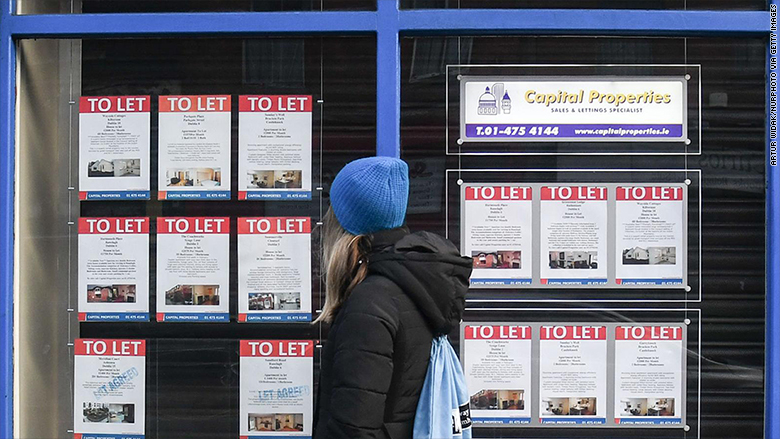
There's a nice little real estate boom underway in Europe.
Europe took 11 of the top 20 spots on a ranking of cities with the largest price increases in the first quarter, according to global property agency Knight Frank. Prices spiked more than 14% over the previous year in Berlin, Rotterdam and Budapest.
EU data back up the findings, showing that home prices increased by an average of 4.7% across the bloc in the first quarter, the highest price growth since late 2007 when the global financial crisis was about to explode.
Demand has been fueled by low interest rates, an improving job market, rising consumer confidence and growing interest from foreign buyers, according to Kate Everett-Allen, a residential property expert at Knight Frank.
At the same time, the number of new homes being built has slumped.
"There's a massive reduction in what's coming out of the ground in terms of new dwellings," said Everett-Allen.
One prime example of the trend is Spain, where only 55,000 new homes were built in 2016. That compares to 735,000 in 2006, before the country's economy was rocked by a debt crisis.
Everett-Allen said that prices have increased 10% in Madrid, making it one of the strongest growth areas.
"Madrid is a key one," she said. "The economy has improved significantly. A lot of commercial activity is feeding into the residential side ... You're seeing interest from European buyers and some from Latin America as well."
Related: Is this the future of home renovation?
Dublin is also bouncing back after a major property bubble burst during the financial crisis. Prices there jumped nearly 12% in the first quarter.
"Prices [in places like Ireland and Spain] are still below their pre-crisis peak," said Everett-Allen. "They're rising from quite a low base."

Small is beautiful
Europe is also seeing a "small-city renaissance" due to increasing interest from young buyers, said Paul Tostevin, associate director at real estate agency Savills.
"Compared to higher-cost, congested global mega-cities, historic European cities on a smaller footprint offer residents shorter commutes, a lower cost of living and high quality of life," he said.

There are some outliers. EU data show that prices in Italy and some Nordic nations are slipping. Knight Frank estimates that prices in Turin dropped 7.1% in the first quarter.
London's famously expensive housing market has also experienced price declines as Brexit and new taxes have scared off buyers.
Related: American prices are rising faster than they have in six years
Changes in monetary policy could constrain future demand.
The European Central Bank has announced plans to end its €2.5 trillion ($2.9 trillion) stimulus program and it could hike interest rates as early as 2019, making mortgages more expensive.
Everett-Allen said buyers may be trying to lock in purchases before rates go up, contributing to the current market strength.


